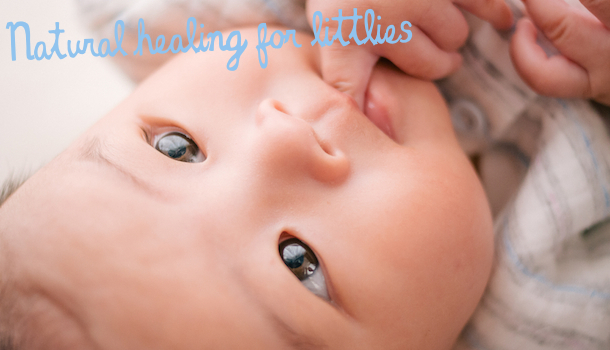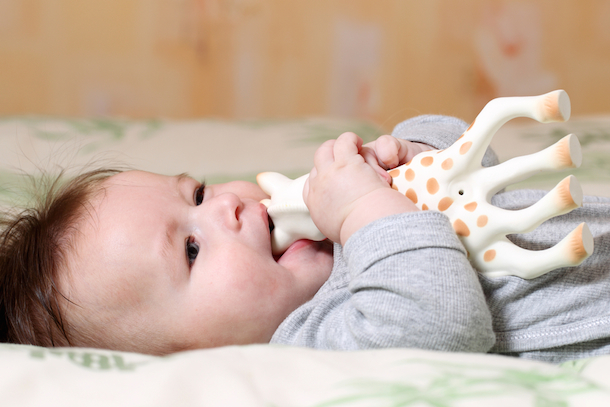
 Post Category - ParentingParenting - Post Category - BabyBaby
Post Category - ParentingParenting - Post Category - BabyBaby Post Category - WellnessWellness - Post Category - HealthHealth
Post Category - WellnessWellness - Post Category - HealthHealthAs a mother, learning how to raise a happy, healthy baby is a huge task. But when your little one falls ill, what do you do? Many mamas may not want to use prescription medication as they don’t want to burden their child’s delicate system but at the same time, they don’t want to do something that may actually make their child worse. So what is the best course of action?
As a naturopathic doctor, I have had the opportunity to help babies and young children get through many an illness using natural therapies – and most with excellent results. There are of course times when alternative medicine may not be your initial go-to and seeking medical attention would be more appropriate (which a good naturopath should be able to determine) but in many cases, especially when an illness is quite mild, natural approaches are often the way to go. I am going to provide, over a two-part series, information on treating ten common childhood conditions using safe natural remedies.
First off, I encourage my patients to always have the following on hand:
- Probiotics
- Coconut oil
- Fresh ginger, garlic, and onion
- Calendula cream or salve
- Essential oils of lavender and eucalyptus
Condition #1: Colic
There are a variety of reasons why your child may have colic. Often problems can stem from your baby’s difficulty in digesting their formula, from problems with cow’s milk or soymilk, and from carbohydrate malabsorption from fruit juices containing sorbitol. If breastfed, colicky babies may react to foods their mother is eating. If your child is suffering from colic, they will usually lift their head, draw their legs up to their tummy, become red in the face, and pass wind with constant crying, which may be worse in the evening.
If your child is breastfed, certain foods you eat can provoke a reaction such as coffee, chocolate, spicy foods, dairy, sulfur foods (onion and garlic) and foods from the brassica family (cabbage, cauliflower, brussel sprouts, or broccoli) as these can upset your child’s digestion. In return, you can drink a tea with chamomile, lemon balm, ginger, and fennel in it to calm their digestive tract. I also advise mothers to take a digestive enzyme as well.
For your child, you can take simple steps to ease their pain such as altering how you change their diaper. Instead of lifting their legs up and compressing their tummy to clean underneath, move their legs side to side. In addition, give them a good probiotic and prepare a tea made from fresh ginger, chamomile, fennel seeds and mint. Once the tea has cooled, allow them to sip on a few teaspoons. I also refer my patients to see either a chiropractor or osteopath along with Bowen or craniosacral therapy. Lastly, there are certain homeopathics that can also be very effective.
Condition #2: Middle ear infection (otitis media)
The highest incidence of ear infections usually occurs during the first 3 years of your child’s life. This is a result of two things: the immune system not being well developed and the ear canal being shorter and at a more horizontal angle than in the adult ear. Drainage is not as effective, especially when the child has an upper respiratory tract infection.
Classic symptoms of ear infections include pulling of the ear, fever, fluid leaking from the ear, irritability, sleeplessness, changes in hearing, and redness around the ear. Do note, an ear infection requires medical attention when you see pus, blood tinged or abnormal colour draining from the ear, any foreign objects inserted into the ear (it does happen!) or if your child complains of an earache and has a high temperature, vomiting, and a stiff neck that doesn’t resolve in a few days.
If you are breastfeeding your child, do refrain from eating dairy and sugar. You can dampen your child’s immune system when you consume too much sugar, and dairy can contribute to excessive mucous production. You will want to help support your child’s immune system so probiotics are a good choice along with ensuring they are receiving adequate vitamin D. I also have parents make onion poultice or garlic ear oil. I only prescribe ear oils when I know the eardrum is not perforated and I encourage you to ensure the same if you plan to use an ear oil. If forceps or a vacuum were used in the delivery of your baby, there could also be misalignment of their cranial bones (contributing to poor drainage) so craniosacral therapy might be effective. Lastly, homeopathics can also be very useful in this situation.
Condition #3: Teething (teething generally starts between 3 to 18 months)
When your child starts to teethe, it can either be relatively pain free or you can have a very upset baby. I always hope it will be a smooth transition but when it isn’t, there are a few things you can do to ease their discomfort. When your child does start to teethe they may have mild diarrhea with a greenish stool, a runny nose, irritability and clinginess, a refusal to eat, difficulty sleeping, swollen gums, excess drooling, face rashes, and a mild fever.
My go-to with teething is chamomile — both in the herb and homeopathic form. In the herb form, make some chamomile tea and soak a clean soft washcloth, then put it in the freezer in a plastic bag. When your baby is showing signs of discomfort, give them the cloth to chew on. The cold cloth will be numbing while the chamomile will help soothe their irritated gums. If your child is on solids, you can either give them a piece of frozen carrot to suck on or blueberries and raspberries. Using berries can be quite messy so to keep things a bit tidier, purchase a soother with a mesh end on it. Lastly, I like to use amber beads, particularly from Amber J Necklaces.
Condition #4: Constipation
It’s common to see great variation in bowel movement frequency amongst breastfed babies. They may have a poop after every feed or only one every 3 to 4 days. It is safe for a breastfed baby not to have a bowel movement for up to 10 days, as long as they are thriving and there isn’t any other symptoms present, such as discomfort passing the stool. It is however, best that they at least have a bowel movement every 3 to 4 days (and that is for formula fed babies as well).
Factors that may contribute to constipation in babies include the breastfeeding mother’s diet, the transition from milk to solids, toilet training, and preschool or school stress. For your child, it may be poor eating habits, such as overconsumption of fast food, excessive intake of simple sugars, not drinking enough water, food sensitivities or a lack of fibre, fruits or vegetables in the diet.
If you are still breastfeeding your child, you can consume probiotics and try reducing food intake of wheat and dairy. Your baby can have probiotics, a bit of prune juice, or a few sips of a herbal tea made with chamomile, fennel, ginger and lemon balm. In addition, I show my patients how to massage their baby’s tummy with coconut oil and lavender essential oil to help encourage a bowel movement.
Condition #5: Diarrhea
Diarrhea can be a tricky one because there can be multiple causes. From infections and malabsorption, to food reactions and food sensitivities, there can also be rare but serious conditions at the root of the problem too. If your child is in daycare and has not been vaccinated against rotavirus, do consider this a possibility depending on the symptoms the child presents with. Make sure you always look for signs of dehydration when it comes to diarrhea. Often diarrhea is a reaction to food – either from what they are eating or if breastfed, what the mother is eating.
If you are breastfeeding your child, then take a good quality probiotic. Avoid drinking caffeine, alcohol, legumes, sugar, and dairy (dairy can be constipating but can also cause diarrhea due to a lactose reaction). Eat foods that are healthy but constipating such as starchy veggies, bananas, rice (white), chilled brown rice water, applesauce or grated apples (grate, let brown, eat raw – creates phenolic compounds that help firm up the stool).
For your baby, probiotics will help greatly, especially if they have recently been on antibiotics or need some immune support. I also show my patients how to massage your child’s tummy to help slow down the body’s urge to poop, alongside certain homeopathics.
Disclosure: This article does not replace medical information from your doctor. Always seek professional advice before changing or eliminating important medications and supplements. It is important to talk to your naturopathic doctor before using botanical medicine or food changes as there may be an interaction with your medication, an allergic reaction, or it may not be advisable to use with certain diseases or conditions. Sources available upon request.






 View All
View All





 View All
View All









 View All
View All







